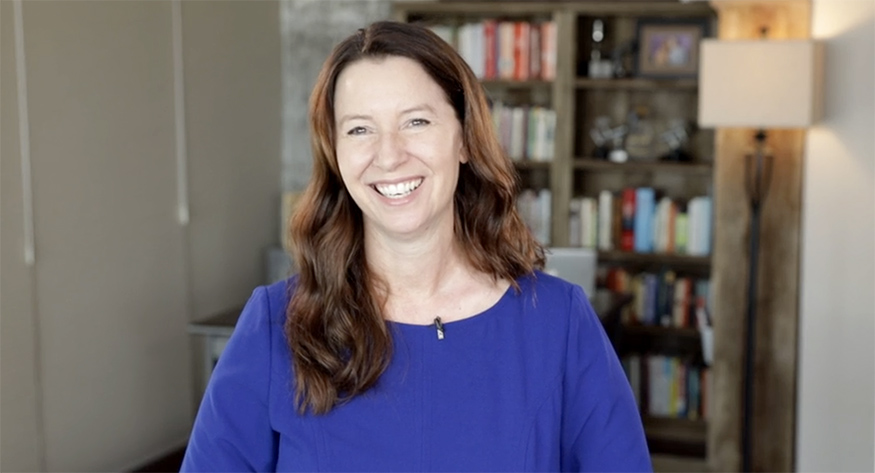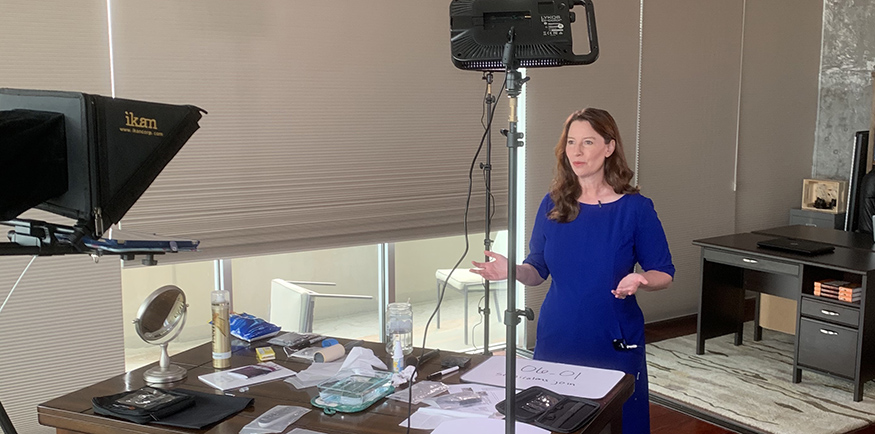
Mignon Coughlin Fogarty (BA, English, 1990) has a huge following for her podcast and other projects. Yet her followers might draw a blank if asked her name. They know her simply as Grammar Girl, a trustworthy guide to the complexities of the English language.
Fogarty’s popular Grammar Girl podcast — with 1.5 million downloads each month — reaches listeners around the world, and her books about grammar have landed her on the New York Times bestseller list. As a UW undergraduate she majored in English, suggesting a direct path from college to her chosen career. But the journey has been far more complicated, including a detour into biology research.
“I wasn’t sure what I wanted to do with my life,” Fogarty recalls of her time at the UW. “I was the first person in my family to graduate from a four-year college, so just getting the degree was the goal. I majored in English because I loved reading and writing, but after I graduated, I felt a little lost.”
A Side Trip to Science
Fogarty’s first job post-graduation was at an insurance brokerage. It was there, she says, that she learned professional etiquette. But she envied friends who had found success as journalists. Noting that they had expertise in specific subject areas — politics, for example — Fogarty figured she would need similar expertise if she wanted to pursue journalism. That expertise, she decided, would be science.
I always say that language changes just fast enough to be annoying. ...It’s helpful to realize that every generation thinks ‘kids today’ are doing it wrong.
"My now-husband was working at one of the hot biotech companies at the time, doing amazing things with DNA,” Fogarty says. “He was always explaining to me what he was doing, and I became fascinated by science.” One problem: Fogarty hadn’t taken a single biology course at the UW. She decided to take a few community college courses to confirm her interest, and became so intrigued that before long she was in a biology PhD program at Stanford University.
Alas, the PhD was not meant to be. After four years in the program, Fogarty found lab work tedious. She left Stanford with a master’s in biology after being recruited as an early employee by startups. “I was drawn to the exciting things going on in the valley at the time,” she recalls. Fogarty worked as the head content writer and editor for several health and science websites until the dot-com bust shuttered many of those companies. Then she started her own business as a freelance technical writer and editor.
As a side project, Fogarty started a science podcast with a friend, just for fun. “I fell in love with podcasting through that project,” she recalls. She had no inkling that her professional life would transform as a result.
The Potential of Podcasting
The science podcast, Absolute Science, was a labor of love. But producing an hour-long program each week while running a freelance business was not sustainable. Fogarty decided that a shorter podcast, just a few minutes long, could satisfy her desire to podcast with fewer time demands. And then a potential topic came to her: English grammar.

“As a writer and editor, I was looking up the writing rules every day in the AP Stylebook or the Chicago Manual of Style,” Fogarty says. “I realized that people need to know all these little writing tips. And since I’m looking them up anyway, and I have the podcasting equipment, why not make a quick little show with a tip every week about better writing?”
Fogarty named the show Grammar Girl and began producing weekly episodes in 2006. To her surprise, the show took off in a way her science podcast never had, reaching number two on iTunes (now Apple Podcasts) within six weeks.
Before long, Fogarty was recruiting friends and neighbors to host similar short podcasts in their area of expertise. She created the Quick and Dirty Tips podcast network with half a dozen shows, then searched for an investor or partner to help grow the business. At first she had no luck. Then the Wall Street Journal chose the Grammar Girl podcast as its pick of the day and everything changed.

“Within a week I got calls from five New York publishers who wanted to do a book deal,” Fogarty says. Most of the publishers had no interest in Fogarty’s podcast network, but an executive from Macmillan mentioned that the company was looking to get into digital businesses. Before long, Fogarty and Macmillian had a three-book deal and a partnership for the Quick and Dirty Tips network.
The Constant is Change
In the years since, Fogarty — still in partnership with Macmillian — has continued to expand her reach. She has published ten books, has grown the podcast network to a dozen specialized podcasts, and is working with LinkedIn Learning on a series of Grammar Girl video courses. Her mainstay, the Grammar Girl podcast, continues to flourish, now with longer episodes to accommodate segments on various language-related topics. Guest writers provide some of the content, offering fresh perspectives.
Given her fame as Grammar Girl, Fogarty finds that people are often self-conscious about how they speak or write when they communicate with her, afraid of using incorrect grammar. But she insists that she rarely notices such errors and when she does, she’s not bothered by them. Beyond her non-judgmental nature, she offers another reason for this, noting that language is always changing, whether we want it to or not.
“I always say that language changes just fast enough to be annoying. Adults will be used to things being a certain way. And then they’re not anymore, and everything feels wrong,” Fogarty says. “But it’s always been that way. When the Constitution was written, nouns were capitalized in English, and now they’re not. Books written in the 1800s are littered with commas and at some point that changed. It’s helpful to realize that every generation thinks ‘kids today’ are doing it wrong.”
More Stories

Finding Love at the UW
They met and fell in love as UW students. Here, 10 alumni couples share how they met, their favorite spots on campus, and what the UW still means to them.

AI in the Classroom? For Faculty, It's Complicated
Three College of Arts & Sciences professors discuss the impact of AI on their teaching and on student learning. The consensus? It’s complicated.

Bringing Music to Life Through Audio Engineering
UW School of Music alum Andrea Roberts, an audio engineer, has worked with recording artists in a wide range of genres — including Beyoncé.
